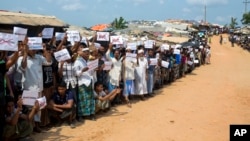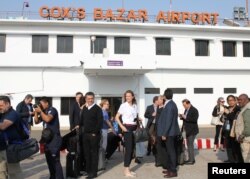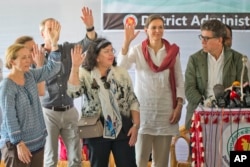A U.N. Security Council team visiting Bangladesh promised Sunday to work hard to resolve a crisis involving hundreds of thousands of Rohingya Muslims who have fled to the country to escape military-led violence in Myanmar.
The diplomats, who visited the sprawling camps and border points where about 700,000 Rohingya have taken shelter, said their visit was an opportunity to see the situation firsthand.
Russia’s ambassador to the United Nations, Dmitry Polyansky, said he and his fellow team members would not look away from the crisis after their visit, though he warned that there were no simple solutions.
“It’s very necessary to come and see everything at place here in Bangladesh and Myanmar. But there is no magic solution, there is no magic stick to solve all these issues,” he said at a news conference at the Kutupalong refugee camp in the coastal town of Cox’s Bazar.
The team members will conclude their three-day visit to Bangladesh on Monday, when they leave for Myanmar.
Latest violence
The recent spasm of violence in Myanmar began when Rohingya insurgents staged a series of attacks Aug. 25 on about 30 security outposts and other targets. In a subsequent crackdown described by U.N. and U.S. officials as “ethnic cleansing,” Myanmar security forces have been accused of rape, killing, torture and the burning of Rohingya homes. Thousands are believed to have been killed.
The diplomats, comprising representatives from the five permanent Security Council members — China, France, Russia, the United Kingdom and the United States — and 10 non-permanent member states, talked to some 120 refugees, including some rape victims.
Peru’s ambassador to the U.N., Gustavo Adolfo Meza Cuadra Velasqez, said he and his fellow team members were ready to “work hard” and were “very concerned” about the crisis.
Safe return home
The refugees are seeking U.N. protection to return home. The U.N. refugee agency and Bangladesh recently finalized a memorandum of understanding that said the repatriation process must be “safe, voluntary and dignified ... in line with international standards.”
Karen Pierce, the UK’s ambassador to the United Nations, said the Security Council would continue to work on enabling the refugees to return to Myanmar.
Rohingya are denied citizenship in Buddhist-majority Myanmar, where they’ve faced persecution for decades. They’re derided as “Bengalis,” and many in Myanmar believe they are illegal migrants from Bangladesh. Muslims in an overwhelmingly Buddhist nation, most Rohingya live in poverty in Myanmar’s Rakhine state, next to Bangladesh.
Thousands of refugees gathered at the Kutupalong camp to welcome the visiting delegation. They carried placards, some of which read, “We want justice.”
“We are not Bengali, we are Rohingya. They have killed my family members, they tortured us, they will kill us again,” said one of the refugees, 29-year-old Mohammed Tayab, standing in front of a tent where he was waiting to meet the U.N. team.
Tayab, who was using crutches, said he was shot by Myanmar troops in his right leg.
He said he lost a brother, an uncle and a nephew after Myanmar soldiers shot them dead.
“I am here to talk to them, we want justice from them,” he said of the diplomats. “I will tell them my stories. They should listen to us.”
Kachin crisis
While the U.N. is looking into the Rohingya crisis, a civil war is raging in northern Myanmar between government forces and another of the country’s minorities — the Kachins.
It’s one of the longest-running wars on Earth, and it has intensified dramatically in recent months, with at least 10,000 people displaced since January alone, according to the United Nations.
The crisis, though, is overshadowed even in Myanmar by violence against Rohingya in the west, nearly 700,000 of whom have been driven into exile by the military. While the conflicts differ, they share a tragic theme, said Zau Raw, who heads a rebel committee overseeing humanitarian aid in the mountainous sliver of territory the militants control along the Chinese frontier.
Just like the Rohingya, the Kachin, who are mostly Christians, have begun to realize that “the army wants to wipe us out,” he said. “This is a war to cleanse us.”






